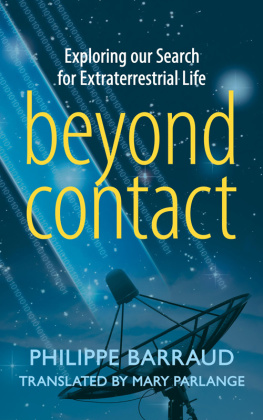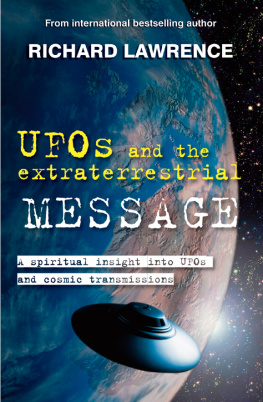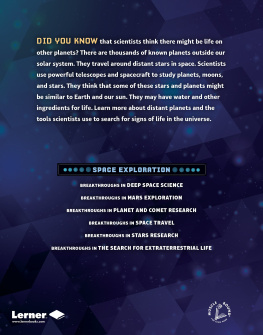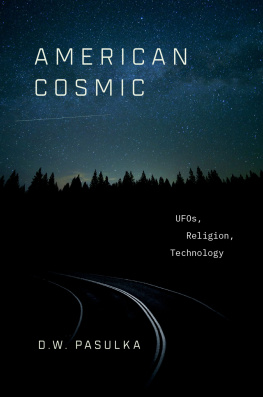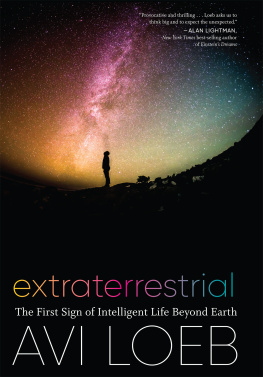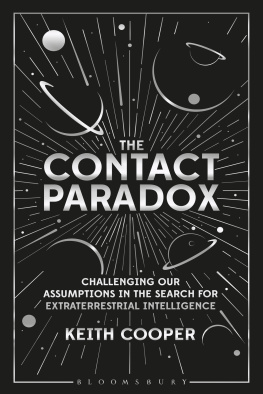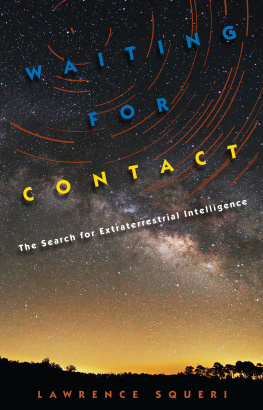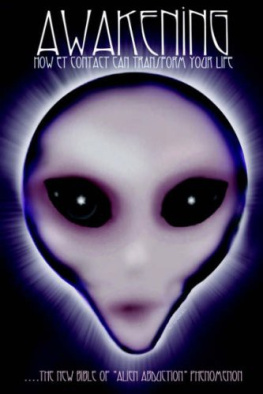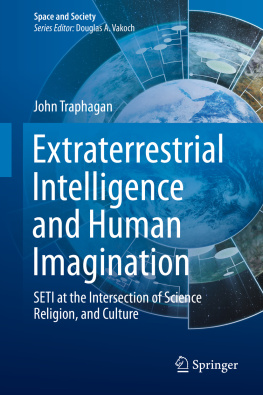www.cocaroli.ch
Copyright 2015 by Philippe Barraud and Mary Parlange
Cover image Twobee/Bigstock.com
All rights reserved, including the right to reproduce this book or portions thereof in any form whatsoever.
ISBN: 978-2-8399-1746-9
TABLE OF CONTENTS
Preface
Over two thousand years ago, the Greek philosophers contemplated the possibility of multiple worlds, even multiple inhabited worlds. Today, the age-old question of Mans place in the Universe is still unanswered. Is life a cosmic imperative, as Christian de Duve suggests? Does life inevitably develop in the presence of favorable physical and chemical conditions, or is it a rare, perhaps unique occurrence? Can we even answer a question like this in the foreseeable future?
Science fictions broad popularity in the past several decades has focused our attention on evolved, intelligent forms of life whose technology is superior to our own, who perhaps pose a threat to humanity. And then our imagination turns to the logical corollary, in which humanity colonizes the Universe, fleeing Earth to set up house on other exoplanets in order to survive.
Philippe Barrauds book takes on this theme of life in the Universe. He carefully dissects the fundamental problems involved in interstellar travel. Science fictions answer to the intractable dilemma of the enormity of the distances, and thus the interminable length of these voyages, is that we just need to accelerate things up to the speed of light. But conveniently ignored is the insane and unattainable amount of energy that would be required to pull this off. Its not enough to dismiss the issue by saying that technological progress will inevitably come to the rescue: the laws of physics are not so easily overcome.
I highly recommend this essay to those who find science fiction fascinating. Its not a book that will quash your dreams; the question of life in the Universe, simple or complex, or perhaps even intelligent and conscious, is still out there, unanswered. And it will remain on the scientific research agenda for a long time to come. Many institutes of astrobiology have been created in order to undertake multidisciplinary studies into the origin of life on Earth and elsewhere. Astronomers, geologists, chemists, biologists and physicists are combining their expertise in an effort to understand life in all its diversity.
At the University of Geneva, we are also contributing to this fascinating body of research. Our work is to identify telluric (solid) planets whose mass is similar to that of the Earth, with the possibility of liquid water on the surface. How many of these habitable planets are orbiting nearby stars? Ideally, wed like to prepare a list of stars where these kinds of planets have been detected; they could be targets for space missions or future studies searching for traces of life. But is it even possible to detect the presence of life on extra-solar planets remotely, without going there? After reading this book you will be convinced that direct exploration of these worlds is not possible. Nonetheless, the spectra of planetary atmospheres observable tens of light years or more away can betray the presence of life on those planets. For example, the presence of massive amounts of oxygen in the Earths atmosphere seems to have no apparent origin other than production by living organisms. Aliens looking at Earths atmosphere from outer space could thus read our skies and tell that Earth harbors living things.
An analysis of the atmospheric composition of exoplanets situated in the so-called habitable zone of their stars can thus be done from Earth. Of course, these studies will be very difficult, but theres no doubt that we will have the necessary technology in the near future.
But when faced with the issues debated in Philippe Barrauds book, studies like these seem extremely modest. They could at best tell us that life exists elsewhere, that it is a cosmic imperative. But that alone the detection, even indirect, of the presence of life outside the solar system would be of major importance from a philosophical standpoint. Its possible (or even probable) that life, once it has emerged, becomes more complex; but to what point? Is the development of intelligence and consciousness also part of this imperative? Obviously no one is in a position to answer these questions.
The search for life in the Universe has also taken other paths. More than three billion years ago, the planet Mars had liquid water on its surface. Did life have time to emerge before Mars lost most of its atmosphere? Many space probes have been sent to the red planet to search for evidence of life. And exploration of the solar system reveals other bizarre surprises. Beneath its fissured ice cap, Europa, one of Jupiters moons, has a liquid ocean maintained by tidal forces induced by its massive neighbor. If there is liquid water there, what is the level of prebiotic chemistry that has been reached within it? And whats the story in the geysers observed on Saturns moon Enceladus? Paradoxically, we are far from having explored all the corners in which life could be hiding in our solar system.
We have, right here on Earth, a space exploration program that could keep us busy for the next few decades! If life is really a cosmic imperative, how can we know that it didnt emerge independently in various different places on the Earths surface? And did all those different lives follow the same biochemical route? Professor Paul Davies and his colleagues are analyzing the DNA of bacteria collected from the most diverse and improbable areas of the planet. Will we find traces of the multiplicity of life in the Universe right here on Earth? The question deserves at the very least our sustained attention.
More than two thousand years have passed between our initial ruminations about the possibility of other worlds and the discovery of extra-solar planets. We can certainly wait a few more for an answer to the question of inhabited worlds.
As Philippe Barraud says so elegantly in his essay:
Believing that the future of Mankind is in the stars is an illusion that is neither exalted nor innocent.
- Michel Mayor
INTRODUCTION
So do extraterrestrials really exist?
Ah were already off to a bad start here. That question, legitimate as it may well be, is woefully imprecise. Do you mean do they exist here and now? Or, perhaps, do they exist on a small blue-green planet somewhere in the Andromeda galaxy? The thing is, if theyre way out there, well never know, because now in Andromeda will only be visible for us Earthlings a few million years from this moment, when the light from their planet will have completed the interstellar journey to ours. And at that point, we might be long gone.
Okay, then, so maybe you mean somewhere in the Milky Way, our own galaxy, in the Orion constellation, perhaps? Theres a small star there called 3 Orionis that resembles our Sun, although its a bit bigger and brighter. Astronomers think there might be solid planets orbiting it, perhaps as small as Earth. Our instruments are not sophisticated enough to observe them directly, but with a bit of luck we may soon be able to detect their presence indirectly. The problem is that if an Earth-like planet exists there, and if an intelligent civilization has developed on it, its still 26 light-years away from us, which makes conversation a bit awkward. The initial exchange of greetings alone would take 52 years.
But nonetheless, we still need to answer the question. Do they exist?
Many, myself included, would say yes, for philosophical and statistical reasons. Think about it. If there are thousands of billions of Earth-like planets in the Universe (and more are born every day), it would be highly improbable for not only life, but intelligent life,

